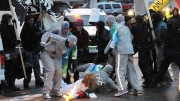OIympic torch protests: challenging a deceitful tradition
Primary tabs
In December, members of Genesee Valley Earth First! and others from Rochester participated in demonstrations against the Olympic torch relay in Canada. We did so because environmental destruction knows no borders, and the games have a sordid history of displacing the poor while legitimizing colonialism and authoritarianism. The torch relay itself was born in Nazi Germany to spotlight the fascist government’s supremacist propaganda.

Aboriginal people in British Columbia have been criticizing the 2010 games in Vancouver since the city first considered making the bid. Most of the land in that western province was never yielded by treaty, meaning that it is illegally occupied by Canada. The government claims to have Native support for the games and exploits Native culture in its Olympic publicity; however, the Host First Nations are made up of Indian Act band councils, which were established by the Canadian government to control Native people and do not reflect the views of most Native people or their leaders.
Concerned about the abuses of land and people, seven of us crossed the border at Niagara Falls with banners and information about Olympic resistance. We joined the large crowd gathered to greet the torch and chanted “No Olympics on Stolen Native Land†while offering literature to those around us. A Native family of five soon joined us and we all marched down the spectator-lined avenue ahead of the torch. Our reception was icy, literally and figuratively. Many people yelled insults at us, some tried tearing the banners from our hands, and one man tried lighting a banner on fire with his souvenir candle.
We chanted until our voices were hoarse, exchanged information with the other protestors, and returned home feeling inspired to raise our voices even louder after witnessing such aggressive nationalism and suppression of our opinions. The following weekend, three of us returned to Ontario for an anti-Olympic rally in Kitchener that drew more than 150 people.
We gathered in a public park where snow swirled around beautiful banners, hot food, and thoughtful conversations. Groups represented at the rally included the Kitchener-Waterloo Centre for Social Justice, Anti-Racist Action, AW@L, Six Nations youth, and others. After music and short speeches, we marched through the city, stopping in front of a branch of the Royal Bank of Canada, where banners were unfurled criticizing the bank’s Olympic funding as well as its support for the mammoth industrial oil extraction project happening in Alberta’s tar sands.
Ultimately, the march reached the city hall, where a large public celebration was taking place with Coca-Cola logos plastered everywhere. The group of protestors raised banners, chanted, distributed literature, and played drums, succeeding in making our presence known to everyone who was there that night. We returned to the park and disbanded, but the Rochester contingent stayed overnight for an early-morning torch ceremony in nearby Guelph.
Protestors were the first of several hundred people to gather in downtown Guelph to greet the torch at seven o’clock. We occupied three street corners with banners, bodies, and information, and just before the torch came into view, we took to the street and marched the route ahead of the runners. The tired voices of our relatively small group (approximately 30) were overwhelmed at times by loud booing by the crowd. We heard a racist insults and the Canadian national anthem, among other things. Emerging from the crowd at the end of the route, we stopped to rest, essentially done with our protest. Surprisingly, the Coca-Cola truck leading the torch parade rounded the corner where we were gathered, followed by the torch runner herself, surrounded by gray-clad guards. We made an impromptu effort to extend our banners to block the road, and the guards threw themselves at us, pushing some of us violently out of the way. In their haste to clear a path, they tripped over one another and the runner went down! One young woman was arrested for assault, but from my perspective at least, the fall was not directly caused by any of the protestors.
The short time we spent in Ontario was eye opening. There is a large, diverse, well-informed resistance movement in Canada of which I was previously unaware. As the torch relay continues through other towns and cities, expect more resistance. The 2010 Olympics are doing a great deal of harm, but they also bring to light many injustices that have long been ignored, and offer a world stage for debate.









